THE MAN IN the hat is a man apart.
As groups of bodies gather, burst and swirl to cover every blade of grass on a sun-kissed field, he remains remarkably still.
Watching, waiting quietly, walking softly in case there comes time to wield the big stick.
The wide-brimmed sun-blocker gives him an air of a Rooster Cogburn or John T Chance. A sheriff in shorts drawing the eye, inspiring many invited in and around the sidelines to speak in hushed rumour of his ‘homespun motivational methods’, imagined as a fistful of the collar of any young man who steps out of line.
Willie Anderson isn’t going to steer away from that characterisation. But as he enters his final year before retiring as an elite player development officer in Ulster’s academy, he is more than just an old school enforcer. He is a totemic figure of what the province is striving to represent.
“I come from a generation, we call ourselves the ’80s warriors,” says the former fiery lock as The42 is treated to a trip through the annals of Anderson’s memory.
It’s a memory that retains a glistening sharp edge. It sparkles with passion; for his sport, his team-mates past and present and, most of all, passion for his province.
For Willie Anderson is Ulster, the province made flesh.
“We lost Nigel Carr in the bomb,” offers the ex-second row of Ireland’s 1987 World Cup in the same matter-of-fact way you expect a modern-day veteran to list off injuries that explained an iffy performance.
At the peak of his athletic powers, when the Troubles touched every corner of Northern Irish life, Anderson made his arrival to the peak of his rugby career at the belated age of 29.
Among those ”80s warriors’, he had to scrap and scrape more than most to reach the international stage. Yet, when you delve just a little deeper into his background, it becomes clear why he stood so resolute and fearless inches from Buck Shelford and the All Black haka, why he never balked at an on-field battle and how he sustained his intensity chasing the green jersey he craved.
***
A mistake.
As stupid as it was harmless, but an error that proved incredibly formative and inescapable.
Rugby brought this hardy farmer’s son from Sixmilecross far, wide and for the most part it has helped to keep him out of harm’s way. But in the dark of post-midnight Buenos Aires, his revelry with team-mates from the touring Penguins club has landed him in quite the situation now.
It’s 1980, and Argentina is under the control of a right-wing military Junta and beset by its Dirty War. Walking back to his hotel with team-mates, Anderson is drawn to an Albiceleste flag and succeeds in his foolhardy mission to remove it from its halyard and smuggle it back to his room.
The cover of darkness, though, was not enough to escape detection. So the then 24-year-old was soon handing the symbolic sheet of material back into the grasp of half-a-dozen machine-gun-toting soldiers who burst into his room to track down the missing banner.
A modern rugby disciplinary hearing might refer to his previous good character and immediate remorse. Unfortunately, the officer holding Anderson’s British passport was not willing to consider this a low-end offence. No, this was a clear case of ‘demeaning a patriotic symbol’ and worthy of incarceration.
There was some small early consolation that he was not alone in the situation. Two team-mates who offered “moral support” by going along with him to the police station that fateful night were arrested for their troubles and detained along with Anderson.
So for a time he had some company to help him cope with the concrete beds, shit-stained cells and intimidating officers telling him of the growing calls for his execution. Once he was left alone, though, it became a month of hard time that put the Tyrone man under the most severe scrutiny.
Outside the prison walls, still two years before the Falklands War, the media pack caught the mood of government baying for his blood and carried to the masses stories of Anderson’s imperialistic assault on Argentine pride.
Some said he doused the flag in flame, others believed it was urine.
“I went through a tough time at that stage. Some of the generals wanted me executed and that sort of craic,” Anderson says in the much more serene setting of a sunny Newforge, where the Abbey Insurance Ulster academy make their home in Belfast.
John Scally’s absorbing book, Legends of Irish Rugby conveys Anderson’s “naked terror (experienced) when you’re in prison and there’s a gun to your head.”
The future captain of Ireland went from a strip-search to day-long interrogation, then to a box before a six-by-four yard cell with his predecessors’ excrement left behind.
All of that he coped with until ‘the loneliest day of his life’ when the fellow tourists arrested alongside him were released.
It was much more serious than anybody here realised at the time. I know for a fact that two or three army generals wanted to have me executed. Others wanted to make sure that I served at least 10 years hard labour.”
Yet while his own hardship still leaves a scar, it’s the impact on his parents that still seems to sting Anderson the most. His family, with the support of the community in Sixmilecross and Dungannon RFC, parted with upwards of £10,000 – allowing for inflation, over €48,000 today – battling for the mis-stepping rugby player to be released.
You can’t put a price on the mental anguish they had to endure. I remember one letter I sent them home that I would hate to have read again, because I had struck rock bottom.”
The dark days dragged up with his memory are completely at odds with how Anderson appears now. Beams of sunshine sneak through the blinds to hit his wizened 64-year-old face as a smile comes from deep within him as a tale leads him to his upcoming wedding anniversary.
“I was sort of going out with a girl at the time. I wrote to her, she wrote back, we wrote and wrote and wrote. And we’re married 36 years tomorrow.”
Anderson’s time-served in Argentina extended beyond the suffocating prison walls. And his outlook on life has been shaped by the experience. Released on bail to a halfway house, he kept his body busy for the remainder of his three-month stay in Argentina, exercising daily by running the roads. His mind became occupied with the injustices suffered by others.
He travelled to Buenos Aires’ outskirts and felt welcomed by monks and the residents of shanty towns. Back in the city, he would glimpse the mothers of the Disappeared feeling grateful that his crime was eventually deemed unworthy of rendition and a watery grave.
Armed with little more than a loose piece of very unofficial advice from the British consulate to consider ‘a Midnight Express’ – a covert border crossing before a circuitous route home – Anderson realised he had to find his own solutions.
“I remember asking, ‘please help me, please help me’ and I realised I had to help myself. I went into myself rather than looking out.
“Eventually I said, ‘right I’ve to get through this, whether I go through Brazil or Uruguay to escape, I’ve to solve this problem.’”
It was certainly a defining moment of my life, defining for my rugby life as well as my own life. A mistake.
“When they realised it wasn’t a political thing, but a prank that went wrong they had to go through due process… it made me resolve and I was even more determined to play for my country.”
Determination was all well and good. But after returning home and returning to rugby with club and province, Anderson still felt as though his path was blocked.
While he may have escaped the two-year suspended sentence in Argentina, yet he remained on a probation of sorts in the eyes of the blazers.
“I think the IRFU wanted me to ‘do my time’, as it were. I probably had to wait two or three years. (In matches) I was beating up Donal Spring or Mike Gibson, the tall one, to show I had the determination to make it.
“I eventually made it when I was 29 and I played on until I was 35. Coming through with that Ulster team; we played a great standard of rugby, we were professional – with a small p – and we had a great mentor in Jimmy D (Davidson), who at that time saw Club Ulster before any of it ever happened.”
Anderson wistfully recalls inter-pro battles with Leinster and Munster that provided an outlet for his insatiable competitive instinct, but they came atop a thriving club scene that maintained a vital sense of all-island connection for people and players within Northern Ireland.
Rugby continuously showed the Sixmilecross second row that there was life and cross-community understanding beyond the entrenched sectarian skirmishes in the Six Counties.
“Being in a right-wing fascist country like Argentina was (back) then, going to Romania the year after – a communist situation – it was like the circle was nearly there. There was only a little gap because the poverty and depression in both countries was unbelievable.
“It gave me a different perspective on what was happening here. Both sides, you don’t know how lucky ye are not to be in a regime where you step out of line left or right and you’re buried where you lie.
“Through all travel, it gave me a greater perspective on how lucky we are as people in this part of the world.”
He adds: “The city I’ve been most welcomed in during my time playing rugby was Limerick. I never had a word said to me in Limerick at any time – and I was in some rough spots – because of the respect rugby had in Limerick.
“I still remember the greatest craic we had… Dungannon and Ulster, whenever we played there we went toe-to-toe and they respected that.
“You didn’t bow down, it was a good contest. But the craic after was mighty.
“One night after a Dungannon match we went into the Shannon clubhouse and we must have sang for three hours, the whole lot of us. It was fantastic — you can’t buy that sort of thing.
“Unfortunately it’s gone out of rugby now.”
***
Anderson was a core element of Ireland’s squad at the first Rugby World Cup in 1987. It was a brave new world of organisation in the sport and professionalism was coming down the tracks far quicker for some than it was for others.
“Compared to now,” says Anderson, a PE teacher by trade before he was rugby coach “it was just, like, amateurish. But it was great to see all the countries there playing and how much it’s taken off now is fantastic.
“The sides like New Zealand and anyone who was a little bit more professional – even Wales in those days – were probably ahead of the ball game. We were still finding our way.”
Without any warm-ups matches arranged, Ireland went into that opener against near and dear neighbours having not played together since that year’s Six Nations.
Even club commitments were quietly encouraged to be shelved in favour of a thick wrap of cotton wool. If ever there was a year when rugby injuries could have been placed in proper perspective, it was then.
A month before the tournament in New Zealand, David Irwin, Nigel Carr and Philip Rainey were travelling south from Belfast to a training camp. They approached the border crossing before 9AM. Unbeknownst to them, Justice Maurice Gibson and his wife Cecily were going in the other direction after being given a Garda escort to the northern reaches of Louth. The Gibsons were the target and were killed by the IRA bomb. The rugby players and two nurses from Dun Laoghaire were collateral damage who were lucky to survive.
“It was an inferno of flame, like a thousand flashbulbs going off at once,” Dr Irwin told RTÉ for the 2010 documentary, Bombings.
I tried to haul Nigel out, but his feet were trapped. I managed to pull them out of his trainers and carried him to the roadside and went back for Philip.”
Dr Irwin’s heroics may have saved the lives of his team-mates, but Carr sustained a broken leg and rib fractures that finished his rugby career at 27. That was the worst incident to befall Ireland around that World Cup, but not the last ailment.
“Things they have now like athletic performance and diet, rest and all the things that are vitally important. We were on a plane for 36 hours, got off and went training,” says Anderson ruefully.
“I don’t think I recovered from that travel and training. My back – I wasn’t able to walk – I was crippled for two or three days. Then we were playing Wales first match up.
“It was a recipe for disaster, an accident waiting to happen. So we didn’t get through to play a lesser side, we played Australia (in the quarter-final) and they got through.
It was good to be part of it and great to be at the inaugural World Cup and that sort of craic. But japers, the preparation left a lot to be desired.
“(Coach Mick) Doyler had a heart attack, he was run off (to hospital) so it was all over the place.
“It was great to be part of it, great to be at the start of the whole thing. Now look at it, it’s mega.”
The World Cup has never been a happy hunting ground for Ireland. ’87 was the first in a litany of hard-luck tales at the sport’s new marquee tournament and next weekend they must defeat the tournament favourites to make this World Cup notably separate from the rest.
Anderson, famously, has history with the All Blacks.
Captain of Ireland during a 1989 Test at Lansdowne Road, he provided the template for anyone who wanted to face down the Ka Mate rather than stand back idly at a safe distance.
“That was a Jimmy Davidson (Ireland coach) factor. It was his idea. Because it still happens: they do the Haka and what happens the home crowd?’”
Anderson lifts his palms and answers the question with the most polite finger to palm round of applause.
“Jimmy Davidson wanted that psychological turn. God rest him, it was an ambition of Jimmy’s that one of the sides he coached or played in would beat the All Blacks, but unfortunately, he never got there.
“I’m delighted that Ireland have now beaten the All Blacks, but I hope that wasn’t their pinnacle.
“If they can do it once, they can do it again. And they’re going to have to if they’re gonna win the World Cup. Because the All Blacks are going to be so hard to beat.”
Though that iconic advance on the cultural challenge came to a sorry end and a 6-23 New Zealand win, Anderson achieved plenty of successful days in green during a truncated career he enjoyed between the age of 29 and 35.
He forced his way into international rugby with a debut against Australia in 1984 before joining Donal Lenihan in the second row for Ireland’s momentous Championship win in 1985. He also speaks proudly of trips with the national team to North America and a tour of France which ought to have contained more capped fixtures than it did.
“We beat France in one of those games, those were great tours. For me, touring was fantastic. Coming from a farm, I didn’t have a lot of money, but rugby was my passport. I was able to see quite a lot of the world – most continents.”
So although rugby lore has cast him as something of a madman for his bold Kiwi confrontation, there is far more to Anderson than the headbanded wild man in the YouTube clip, or the hot-tempered enforcer that now stalks the training field.
The fight is in him, of course it is, but it underlies a warmth for people and his province.
You needn’t spend much time with Anderson to feel the strong strains of Ulsterism pour through. Though he has coached Dungannon to an AIL title, worked with Leinster, Scotland and in England, his work now is to shape the northern province’s next generation. And a vital component of his efforts are to imbue a sense of identity and place within the players under his watch.
Anderson’s father was a staunch Unionist and he came of age at the height of the Troubles. Yet there was never a doubt in his mind who he wanted to represent.
“I always say, in a scrum I’d have my arm around a Munster man, a Connacht man pushing me up the arse, a Leinster man here and I’d have my hand through an Ulsterman’s legs.
‘That’s what Irish rugby is. I come from a unionist background, but whenever I fell in love with rugby, at 11, all I wanted to do was play for Ireland. I wanted to play with Ken Goodall or Willie Duggan.
“It didn’t matter where you come from if you fell in love with the game.”
Like most in modern Ulster, Anderson balks at the notion that a hard border would return and put obstruction between the six counties and three in ‘the South’ that Ulster Rugby has worked so hard to develop as contributors to their playing personnel rather than outsiders.
The looming and ongoing threat of Brexit threatens to undo so much work that has been done to break down barriers physical and imagined between places, people and communities across Ulster. For Anderson, bringing politics into line with the island’s rugby team has made sense long before Dominic Cummings set about taking Sterling out of the common market.
“I just think it’s absolute lunacy,” he says at the mention of Brexit.
“I think even in my lifetime it will be all-Ireland. Now my father would have said the same even though he was a unionist and an Orangeman – he was brought up in that sort of community. It could happen in my lifetime and I don’t think it will matter to most people, most middle-ground people.
“There’s going to be people on both sides, there always have been, but it would be great if we could get on and they could just see outside their pillars and see how lucky we are compared to the rest of the world.
“I know people in Belfast who have never been outside Belfast, people in Dublin who have never been to the North.”
He doesn’t always convey such a welcome hand across the border. Before we sit down with Anderson, a colleague of his dares The42 to ask what the wily forwards coach thinks of the blue training kit the players are decked out in. A shade too close to Leinster maybe?
“Ach, it’s a lovely jersey, but…”
He explains that flying a colour, a symbol of difference to the three rivals on the island is important to him. And he sees it as his duty to pass those values, that Ulster identity, on down to the teenagers and 20s now under his and academy director Kieran Campbell’s wing at Newforge.
That’s how Anderson sees his key role in Ulster right now, sustaining that link to the province’s soul while the next generation are being prepared.
“They have to understand what it means (coming from school to province) it’s not just them now. The club will be there when they leave, and there’s a lot of legacy gone before them. What values those Ulstermen brought not only to Ulster, but to the Irish side.
“I come from a generation, we call ourselves the ’80s warriors, the Keith Crossans, Trevor Ringlands… Philip Matthews and all those guys. They had to fight in Ireland to be the best province, because they knew that if they didn’t do that they weren’t going to get on the Ireland team.
“Jimmy Davidson created us into a team that was formidable. Not only did we play for eachother and have certain standards for what was expected when you came on the team, when you played for the team and what you did off the team.
“Never giving up,” he says pointing to last-gasp wins over Leinster in his heyday, “that was drilled into us.
“That, to me, is what an Ulsterman is; you never give up, you keep fighting.
“‘Ulsterism’ is a vital component (in the province’s team today). A Leinster man is different, Connacht men are different, a Munster man is different. He’s got his unique something.
“So I think the more Ulster men you have on the team the better that can flow. Now, the people who have come in have bought into that. That’s vitally important that you have that warrior instinct, the mentality that I just feel is vitally important if you’re going to be a winning side.”
“There’s a good environment. Because we’ve taken values from my time, from his time, because values transcend, whether you’re professional or amateur, It’s still the values of Ulster Rugby
“I just believe it has to be very much embedded into the players. I call them warriors, they’re the guys you can trust no matter what the pressure is coming on.”
The modern player, young or old, won’t feel quite the same pressure as Anderson experienced through his extraordinary rugby career.
But his hard stare from under the brim of that hat certainly turns up the heat.
The42 is on Instagram! Tap the button below on your phone to follow us!






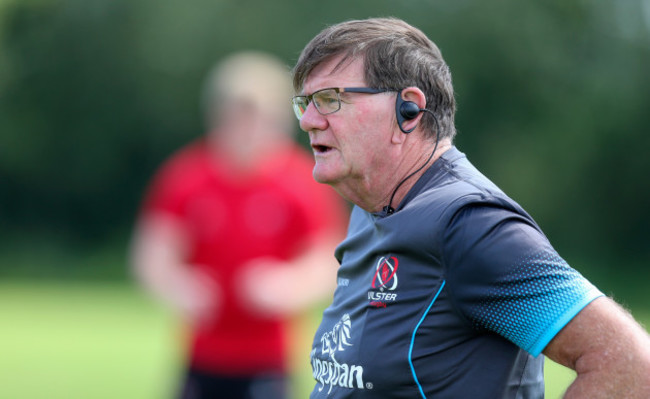
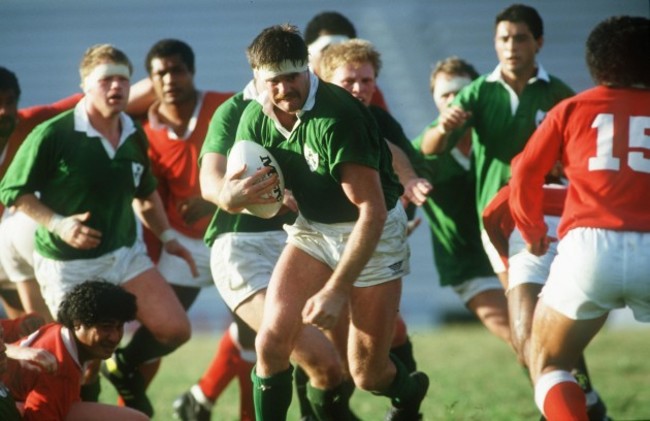
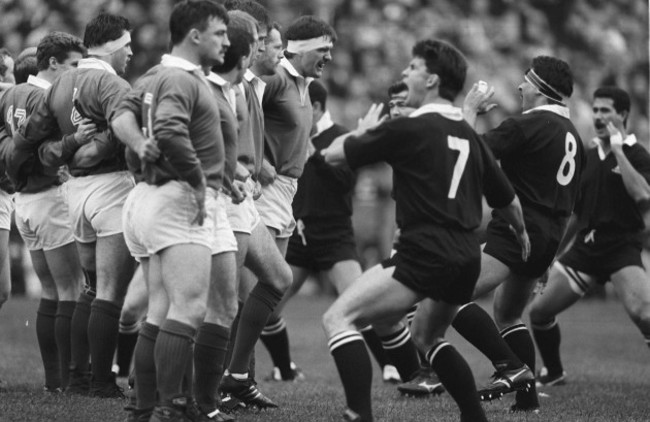
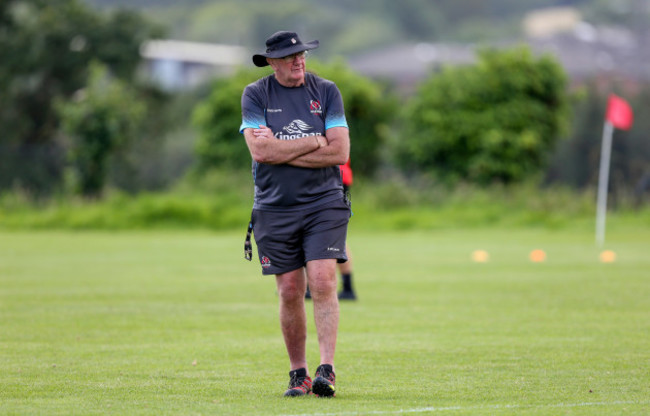



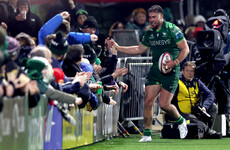
When I read the headline it seemed as though he was trying to deny a sexual relationship
@Hanzee: if you saw her you’d understand why that wouldn’t be the case
Irish backroom option???
@RO’S: Not in a month of Sundays
@Coco86: Why not? He sorted out an underperforming Leinster and put steel into them!